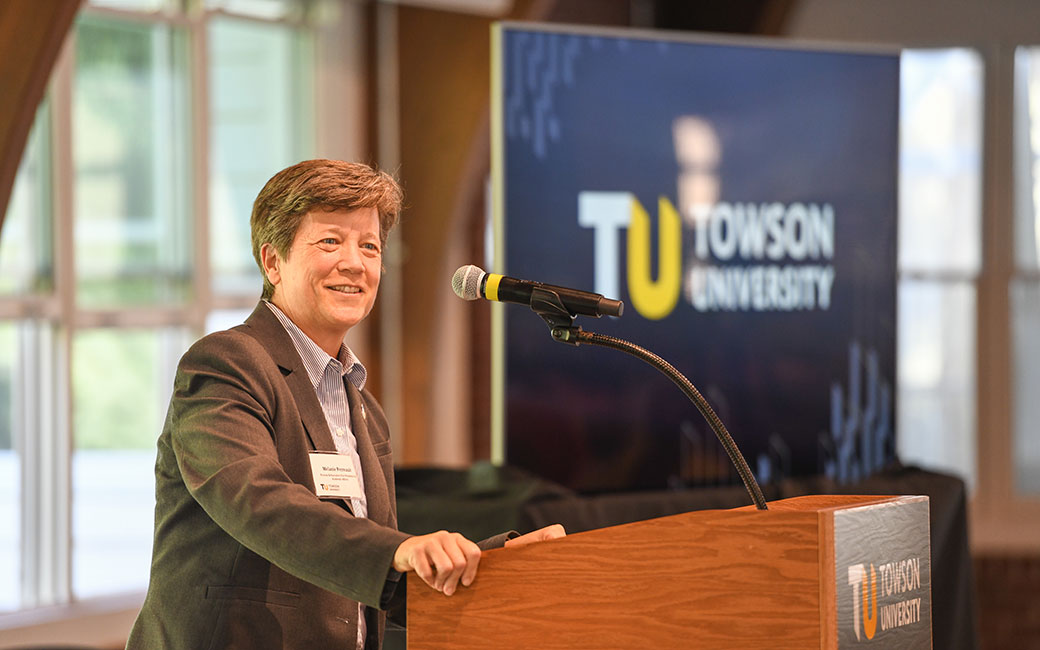
Interim President Melanie Perreault talks new role, First Amendment, connecting with students
By: Caitlyn Freeman, Editor in Chief
Provost Melanie Perreault became the interim president of Towson University on Wednesday, Feb. 1, after the departure of Kim Schatzel. The Towerlight sat down with Perreault to discuss this new role and the overall campus.
Below are the transcribed questions and answers:
The Towerlight: What is your main priority going into your tenure as interim president?
Perreault: So as interim president, I mean, the good news is that TU’s in great shape, got great momentum going in the right direction, has a strategic plan that we’re all excited about fulfilling. And so, really, my job as interim president is to keep that momentum going. Keep the ship righted, and, essentially, prepare for a smooth transition to the new president.
The Towerlight: What is one issue on campus that is really important to you and why?
Perreault: So, not surprisingly, because in my other role, I’m the provost, so Academic Affairs, of course, is my area of most interest. So really, this effort to get that the R2 status and do the research for it, I’m really excited about that. We’ve got a bunch of great accomplishments in this area.
So we’ve already far exceeded the research expenditures that are required to be an R2. We more than doubled it in the last year. So that’s an amazing accomplishment for this university. So I’m really excited about continuing that momentum. We’ve got that going on.
The Towerlight: Recently, there’s been a lot of conversations on campus about the First Amendment and student organizations, specifically with Turning Point and the messages that got released to campus. While TPUSA and the messages didn’t violate university policy, a lot of students wanted to see a more aggressive response from university leadership.
Stepping into this role, what are you thinking about in terms of addressing student concerns that are concerns about hate speech and bigotry existing on campus but are protected by First Amendment rights?
Perreault: the First Amendment, of course, is complex. It’s oftentimes difficult, super challenging, but in many ways, it, you know, and it’s very challenging nature, it’s also something that makes the United States unique, really in the world. So it’s many times frustrating, but it’s also a value that’s made the United States what it is, right? […] Oftentimes, it allows for, you know, uncomfortable dialogue in the country.
So my perspective is, as a historian and that’s, you know, my area of expertise. I’m not a legal scholar on the First Amendment, but I understand the history of it and a lot of the challenges that happened over time around this. So it is a core value of what it means to be American. And so, as institutions, of course, we’re going to support the First Amendment and are bound by the laws surrounding it.
But what we can do as an educational institution, I think, what we’d like to do as well, we, of course, are bound by the First Amendment, and we support it, right? We have to live sometimes in this uncomfortable world. And so oftentimes, we have to have conversations about things that we don’t agree with. As an educational institution, we need to double down on that, which is to be a place where we can have conversations and educate folks about why you may have the right to say this thing. Here’s why maybe you should think about it. And let’s have this dialogue.
And so Turning Point is a recognized student organization; they follow the rules that are set up for all student organizations. And so my perspective is that they then have right to [be a] student organization, as long as they follow all the rules that have been set aside and that everybody has to follow.
The Towerlight: Some Towson students said they feel as though the university administration is disconnected from the student body, are you thinking about ways to alleviate this as you step into your new role?
Perreault: I think getting out on the campus, meeting with students talking to students, faculty, staff, everybody. You know that is a really important role of both the provost but even more so in this interim president role.
So I think you’ll find in the next few months that you’ll get tired of seeing my face. So I tend to walk the campus a lot and talk to students and people as I go around. And so my job is to be out there and talking to folks, and I do expect to be out there talking and, more importantly, listening.
The Towerlight: How will your experiences in your role as Provost impact your decision making as interim president?
Perreault: As provost, I also have the title executive vice president, and so I work across the board with really all the units on campus already. And so I’m really quite familiar with all different operations […] So, Student Affairs, enrollment management, they report directly to me. So I have a lot of knowledge of those areas.
But I’m a member of the President’s Cabinet. Really, we all work collegially together. And so one of the things I’m really excited about is we have an amazing team, the president’s cabinet, we have people who are experts in their fields. And so my job has always been to collaborate with members of the cabinet on all sorts of big issues. And this is just another step in doing so. […] The team is there. I, you know, I don’t have to invent anything. It’s a super capable group.
Editor’s note: This interview with Perreault was conducted on Jan. 26, 2023, before she assumed the role as interim president. It was withheld from publication at the request of the university until Perreault officially became the interim president.

